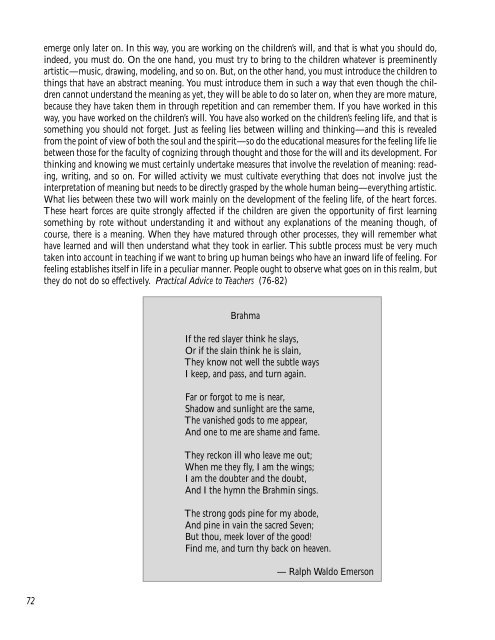Colloquium on English - Research Institute for Waldorf Education
Colloquium on English - Research Institute for Waldorf Education
Colloquium on English - Research Institute for Waldorf Education
Create successful ePaper yourself
Turn your PDF publications into a flip-book with our unique Google optimized e-Paper software.
72<br />
emerge <strong>on</strong>ly later <strong>on</strong>. In this way, you are working <strong>on</strong> the children’s will, and that is what you should do,<br />
indeed, you must do. On the <strong>on</strong>e hand, you must try to bring to the children whatever is preeminently<br />
artistic—music, drawing, modeling, and so <strong>on</strong>. But, <strong>on</strong> the other hand, you must introduce the children to<br />
things that have an abstract meaning. You must introduce them in such a way that even though the children<br />
cannot understand the meaning as yet, they will be able to do so later <strong>on</strong>, when they are more mature,<br />
because they have taken them in through repetiti<strong>on</strong> and can remember them. If you have worked in this<br />
way, you have worked <strong>on</strong> the children’s will. You have also worked <strong>on</strong> the children’s feeling life, and that is<br />
something you should not <strong>for</strong>get. Just as feeling lies between willing and thinking—and this is revealed<br />
from the point of view of both the soul and the spirit—so do the educati<strong>on</strong>al measures <strong>for</strong> the feeling life lie<br />
between those <strong>for</strong> the faculty of cognizing through thought and those <strong>for</strong> the will and its development. For<br />
thinking and knowing we must certainly undertake measures that involve the revelati<strong>on</strong> of meaning: reading,<br />
writing, and so <strong>on</strong>. For willed activity we must cultivate everything that does not involve just the<br />
interpretati<strong>on</strong> of meaning but needs to be directly grasped by the whole human being—everything artistic.<br />
What lies between these two will work mainly <strong>on</strong> the development of the feeling life, of the heart <strong>for</strong>ces.<br />
These heart <strong>for</strong>ces are quite str<strong>on</strong>gly affected if the children are given the opportunity of first learning<br />
something by rote without understanding it and without any explanati<strong>on</strong>s of the meaning though, of<br />
course, there is a meaning. When they have matured through other processes, they will remember what<br />
have learned and will then understand what they took in earlier. This subtle process must be very much<br />
taken into account in teaching if we want to bring up human beings who have an inward life of feeling. For<br />
feeling establishes itself in life in a peculiar manner. People ought to observe what goes <strong>on</strong> in this realm, but<br />
they do not do so effectively. Practical Advice to Teachers (76-82)<br />
Brahma<br />
If the red slayer think he slays,<br />
Or if the slain think he is slain,<br />
They know not well the subtle ways<br />
I keep, and pass, and turn again.<br />
Far or <strong>for</strong>got to me is near,<br />
Shadow and sunlight are the same,<br />
The vanished gods to me appear,<br />
And <strong>on</strong>e to me are shame and fame.<br />
They reck<strong>on</strong> ill who leave me out;<br />
When me they fly, I am the wings;<br />
I am the doubter and the doubt,<br />
And I the hymn the Brahmin sings.<br />
The str<strong>on</strong>g gods pine <strong>for</strong> my abode,<br />
And pine in vain the sacred Seven;<br />
But thou, meek lover of the good!<br />
Find me, and turn thy back <strong>on</strong> heaven.<br />
— Ralph Waldo Emers<strong>on</strong>

















